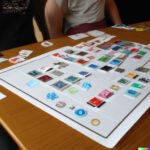Are you tired of always coming in last place during game night? It might be time to step up your board game strategy.
In this article, we’ll explore the world of board games and delve into the importance of having a strategy list to improve your gameplay. Whether you’re a fan of classic games like Chess and Monopoly or enjoy modern favorites such as Settlers of Catan and Pandemic, having a solid strategy can make all the difference in securing victory.
Board games have been a beloved pastime for centuries, challenging players to outwit their opponents and claim victory. From the traditional classics that have stood the test of time to modern creations that continue to push the boundaries, each game presents its own unique set of challenges and opportunities for strategic thinking. By developing a strategy list specific to each game, players can gain a competitive edge and increase their chances of success.
Throughout this article, we will take an in-depth look at the strategy lists for both classic and modern board games. Additionally, we’ll discuss the differences between cooperative and competitive games, as well as how player count can impact strategic decision-making.
By the end of this exploration, you will be equipped with practical tips for developing an effective strategy list for any board game, ensuring that you are ready to dominate your next gaming session. So let’s roll the dice (or move our pieces) as we dive into the fascinating world of board game strategies.
Classic Board Games
Board games have been a staple of entertainment for centuries, bringing people together for friendly competition and strategic gameplay. When it comes to classic board games like Chess, Monopoly, and Scrabble, having a well-thought-out strategy list can make all the difference in securing victory. These timeless favorites require careful planning, calculated moves, and an understanding of the game’s mechanics in order to succeed.
In Chess, the strategy list is crucial for anticipating your opponent’s moves while simultaneously planning your own tactical maneuvers. Understanding the value of each piece and how they can work together as a cohesive unit is essential for victory.
Similarly, Monopoly requires a detailed strategy list for property acquisition, development, and financial management. Knowing when to invest in properties, negotiate trades, or time your opponents’ bankruptcies can give you the upper hand in this iconic game of real estate domination.
Scrabble, on the other hand, relies heavily on word knowledge and placement strategies. A comprehensive strategy list should include tips on maximizing point-scoring opportunities by utilizing double or triple word/letter spaces while also minimizing opponents’ chances to do so. Additionally, having a strong grasp of two-letter words and high-scoring letter combinations can greatly improve your chances of success in this classic word game.
Modern Board Games
When it comes to modern board games, having a well-thought-out strategy is essential for success. Whether you’re playing Settlers of Catan, Ticket to Ride, or Pandemic, understanding the strategic elements of these recent popular board games can greatly improve your chances of winning. Here are some key strategic elements to consider when playing these modern board games:
- Settlers of Catan: In this game, it’s crucial to strategically place your initial settlements and roads in order to secure valuable resources. Building towards certain development cards and strategically trading with other players can also give you an edge.
- Ticket to Ride: Planning your routes efficiently and blocking your opponents from completing their routes are important strategic elements in Ticket to Ride. Additionally, keeping an eye on the available train cards and maintaining flexibility in your route planning can contribute to a successful game.
- Pandemic: Collaboration and communication are key in Pandemic as players work together to contain and cure diseases around the world. Prioritizing which cities to treat, preventing outbreaks, and balancing between finding cures and managing outbreaks are critical strategic decisions.
Understanding these strategic elements for modern board games like Settlers of Catan, Ticket to Ride, and Pandemic can enhance your gameplay experience and lead to more successful outcomes. With practice and a solid strategy list in place, you can improve your chances of victory in these engaging board games.
Remember that each game has its own unique strategic elements that may require different approaches. By developing a comprehensive strategy list for each game you play, you can adapt more effectively during gameplay and ultimately increase your chances of success.
Cooperative vs Competitive Games
When it comes to board games, players often have to consider whether they want to work together as a team or go head-to-head in competition. Cooperative games and competitive games each require different approaches and strategies, making it important to understand the distinctions between them when developing a strategy list.
Cooperative Games
In cooperative games like Forbidden Island, players must collaborate and communicate effectively in order to achieve a common goal. This type of game requires a strategy list that prioritizes teamwork, problem-solving, and resource management. Players need to strategize about the best ways to support each other and allocate resources efficiently to succeed as a group. Cooperative games often involve devising plans that benefit the entire team rather than individual players.
Competitive Games
On the other hand, competitive games like Risk demand a different type of strategy list. In these games, players are focused on outsmarting and outmaneuvering their opponents to achieve personal victory. The strategy list for competitive games typically involves elements such as territory control, bluffing, and calculated risk-taking. Players may need to focus on tactics that give them a competitive edge over their opponents while also safeguarding their own position on the board.
By contrasting the strategy lists for cooperative and competitive games, players can gain a better understanding of the unique considerations involved in each type of gameplay. Whether working together towards a shared objective or vying for individual dominance, having a well-developed strategy list is essential for achieving success in any board game scenario.
Player Count and Strategy
Player Count and Strategy in Carcassonne
When it comes to the classic game of Carcassonne, the number of players can significantly impact your strategy list. In a two-player game, players have more control over the board and can focus on completing larger features to maximize points.
On the other hand, in a game with more players, it becomes essential to block opponents from completing their features while also ensuring your own success. As such, your strategy list for Carcassonne should include different approaches based on the player count.
Strategic Considerations in 7 Wonders
In 7 Wonders, player count influences the availability of cards and resources throughout the game. With fewer players, there are more opportunities to acquire specific cards and resources as they circulate through fewer hands. Conversely, in games with more players, certain resources may be scarcer and you must adapt your strategy list accordingly. Additionally, tailoring your wonder choices and focusing on resource management becomes crucial when considering player count in 7 Wonders.
Adjusting Your Strategy List for Different Player Counts
To develop an effective strategy list for games like Carcassonne and 7 Wonders, it’s important to carefully consider how player count impacts gameplay dynamics. The key is to be flexible and adaptable, taking into account how each additional player changes the overall strategies at play. By understanding these nuances and adjusting your approach accordingly, you can optimize your chances of success regardless of the number of participants in the game.
Tips for Developing a Strategy List
Developing a strategy list for any board game can significantly improve your chances of success and enjoyment. Whether you’re a seasoned player or new to the world of board games, having a well-thought-out strategy can make all the difference in your gaming experience. Here are some practical tips for creating an effective strategy list that can be applied to any board game.
First and foremost, it’s essential to thoroughly understand the rules and objectives of the game you’re playing. Take the time to study the game’s components, mechanics, and win conditions. This foundational knowledge will form the basis of your strategy list and guide your decision-making throughout the game.
Next, consider the strengths and weaknesses of each player in the game. Identifying their play style, preferences, and tendencies can help you anticipate their moves and adapt your strategy accordingly. Additionally, understanding how your own strengths and weaknesses align with the game’s objectives will inform your approach to developing an effective strategy list.
When developing a strategy list, it’s crucial to be flexible and adaptable. Unexpected events or moves from other players may require you to adjust your original plan on-the-fly. By being open to changing tactics when necessary, you’ll increase your chances of success in any board game scenario.
| Tips for Developing a Strategy List | Practical Advice |
|---|---|
| Understand Game Rules/Objectives | Thoroughly understand rules and objectives before developing a strategy |
| Player Analysis | Identify player strengths/weaknesses to anticipate moves and adapt strategy |
| Flexibility | Be open to adjusting tactics on-the-fly based on gameplay circumstances |
Case Studies
While developing a strategy list for any board game can be beneficial, it’s important to note that specific games may require unique and tailored strategies to ensure victory. In this section, we will delve into case studies of individual board games, providing an in-depth analysis of strategy lists for each, along with step-by-step breakdowns of successful game-winning strategies.
One example of a game that requires a comprehensive strategy list is Settlers of Catan. This popular modern board game involves resource management and strategic placement of settlements and cities. A winning strategy might involve prioritizing certain resources, such as brick and wheat, while also strategically placing settlements to maximize resource production. Understanding the probabilities associated with different dice rolls can also inform the development of a successful strategy list for this game.
Another case study worth exploring is Chess, known for its complex strategic elements and high skill ceiling. Developing a strategy list for Chess involves understanding the strengths and weaknesses of each piece, predicting opponent moves, and planning several steps ahead. Successful game-winning strategies often involve controlling the center of the board, maintaining piece coordination, and executing effective pawn structures.
Lastly, let’s consider Ticket to Ride as a case study for developing a strategy list. This classic board game requires players to build train routes across various destinations on the map. A strong strategy list might include analyzing route cards efficiently, blocking opponents’ routes tactically, and focusing on completing longer routes for maximum points.
These case studies illustrate how specific board games demand unique strategies to achieve victory. By conducting in-depth analyses and breaking down successful strategies step by step, players can gain valuable insights into creating effective strategy lists tailored to each game’s mechanics and dynamics.
| Board Game | Key Strategy Elements |
|---|---|
| Settlers of Catan | Prioritize resources; strategic settlement placement; understanding dice roll probabilities |
| Chess | Control center of the board; maintain piece coordination; execute pawn structures effectively |
| Ticket to Ride | Analyze route cards efficiently; block opponents’ routes tactically; focus on completing longer routes |
Conclusion
In conclusion, having a strategy list for board games is crucial for success, whether you are playing classic games like Chess and Monopoly or modern favorites like Settlers of Catan and Pandemic. By analyzing the strategic elements of different games, players can develop a better understanding of their own strengths and weaknesses, as well as those of their opponents. This allows for more informed decision-making during gameplay, leading to a more enjoyable and competitive gaming experience.
Moreover, the contrast between cooperative and competitive games, as well as the impact of player count on strategy, demonstrates that a one-size-fits-all approach to strategy lists does not exist. Each game requires its own unique set of tactics and considerations, which players must adapt to in order to maximize their chances of winning. Therefore, the tips provided for developing a strategy list offer valuable insight into how to tailor strategies to specific games and playing conditions.
As readers gain new knowledge about crafting effective strategy lists based on this insightful exploration of board games, they are encouraged to put these newfound skills into practice during their next game night. No matter what game is being played, having a solid strategy in place can make all the difference in achieving victory. So go ahead – gather your friends or family, choose a board game from your collection, and put your strategic prowess to the test.
Frequently Asked Questions
What Are Some Good Strategy Board Games?
Some good strategy board games include Settlers of Catan, Ticket to Ride, Pandemic, and Chess. These games require players to make thoughtful decisions, plan ahead, and adapt to changing circumstances.
How Do You Strategize in Board Games?
Strategizing in board games involves considering both short-term and long-term goals, anticipating opponents’ moves, managing resources effectively, and being flexible in one’s approach. It often requires a balance between offense and defense.
What Is a Strategic Board Game?
A strategic board game is a game in which success is determined by the decisions made by the players rather than luck or chance. These games typically involve planning, resource management, and competition with other players for victory. Examples include Risk and Axis & Allies.

I love playing all kinds of games – from classics like Monopoly to modern favourites like Ticket to Ride.
I created this blog as a way to share my love of board games with others, and provide information on the latest releases and news in the industry.





